Moreover, brethren, I do not want you to be unaware that all our fathers were under the cloud, all passed through the sea, all were baptized into Moses in the cloud and in the sea, all ate the same spiritual food, and all drank the same spiritual drink. For they drank of that spiritual Rock that followed them, and that Rock was Christ. But with most of them God was not well pleased, for their bodies were scattered in the wilderness (1 Cor 10:1-5).
I wrote a blog saying it was unlikely that the entire Exodus generation was regenerated. See here. That led to a nice email from a friend named Jon:
Very interesting! How do you see this in light of 1 Corinthians 10:1-4? Paul seems to be saying all those who came out of Egypt were saved. What is the context of the “all” in those verses? If they drank from the Rock and the Rock was Christ, wouldn’t that mean they were saved?
All the fathers of the Jewish people: 1) were under the cloud; 2) passed through the sea; 3) were baptized into Moses; 4) ate the same spiritual food; and 5) drank the same spiritual drink.
Yet, notice the contrast in verse 5. Instead of God’s being pleased with all of them, He was displeased “with most of them”–that is, all but Joshua and Caleb.
None of those five elements suggests that the entire Exodus generation was born again. A cloud guided them. They passed safely through the Red Sea. They were baptized into Moses, meaning that they all identified with and followed Moses as their leader. They all ate the manna that God provided. They all drank the water that often came miraculously from a rock (i.e., from Christ).
Christ was the Source of the water they drank in the wilderness. That’s Paul’s point in verse 4. But the water was water, not a metaphor for the message of everlasting life as it is in John 4:10-14. “Drinking living water” is a figure of speech for believing in Jesus. The Exodus generation did not believe in the coming Messiah for everlasting life when they drank the physical water provided by the Messiah.
Jesus fed 5,000 men, plus women and children, but that didn’t mean they were all born again. Jesus provided wine at the wedding of Cana, but that didn’t mean that those who drank the wine were eternally secure.
I checked the commentaries. I found one that said that because God was not pleased with most of them, “they forfeited God’s favor and failed of the promised salvation” (Lange, Kling, and Poor, 1 Corinthians, p. 198). It is possible that this commentary does not mean salvation from eternal condemnation, but salvation from the wilderness and entrance into the Promised Land.
Commenting on 1 Cor 10:12, Gordon Fee is clear in his understanding: “This can only mean that the Corinthians, too, as Israel, may fail of the eschatological prize, in this case eternal salvation (see on 6:9–11)” (First Corinthians, p. 459). That view is totally contrary to the clear meaning of John 3:16 or Eph 2:8-9.
The point in 1 Cor 10:1-5 is that having great spiritual resources does not guarantee spiritual success. The point is not that the entire Exodus generation was born again.


